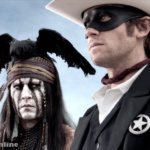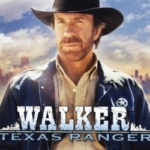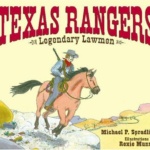With the upcoming summer blockbuster movie, The Lone Ranger, starring Johnny Depp and Armie Hammer, the history of this popular
 character will no doubt receive extensive media coverage. The origin story is fairly well known. The Lone Ranger began as a radio drama on a Detroit radio station in 1933. It was conceived and written by writer Fran Striker who was responsible for many popular radio dramas, including The Green Hornet.
character will no doubt receive extensive media coverage. The origin story is fairly well known. The Lone Ranger began as a radio drama on a Detroit radio station in 1933. It was conceived and written by writer Fran Striker who was responsible for many popular radio dramas, including The Green Hornet.
But as I learned in researching my picture book, Texas Rangers: Legendary Lawmen, the real stories of the Texas Rangers are far more exciting than anything a writer, actor or movie producer could conceive. The Texas Rangers helped bring law and order to a vast frontier. It’s no wonder they provided ample fodder for fiction.
After becoming a near overnight sensation on radio, The Lone Range r became one of the most popular radio shows of all time. But it took the advent of television in the 1950’s to really bring The Lone Ranger to its pop cultural zenith. The television show aired from 1949 to 1957 and made a star of Clayton Moore who played the masked lawman (except for one season when he sat out during a contract dispute and was replaced by actor John Hart). Jay Silverheels starred as Tonto, billed in those days of near complete lack of a social conscience as the Lone Ranger’s ‘faithful Indian companion’. (And how interesting is it that Depp has chosen to play Tonto in the film, not the masked lawman?) It was the ABC television networks first big hit of the 1950’s. It also led to two theatrical movie releases.
r became one of the most popular radio shows of all time. But it took the advent of television in the 1950’s to really bring The Lone Ranger to its pop cultural zenith. The television show aired from 1949 to 1957 and made a star of Clayton Moore who played the masked lawman (except for one season when he sat out during a contract dispute and was replaced by actor John Hart). Jay Silverheels starred as Tonto, billed in those days of near complete lack of a social conscience as the Lone Ranger’s ‘faithful Indian companion’. (And how interesting is it that Depp has chosen to play Tonto in the film, not the masked lawman?) It was the ABC television networks first big hit of the 1950’s. It also led to two theatrical movie releases.
The Texas Rangers and their legendary exploits were fertile a ground for a variety of storytellers. There were many more popular incarnations of the men and women who wore the star, both on radio and television.
Perhaps the most famous or at least best known to recent audiences is the TV show Walker, Texas Ranger, starring Chuck Norris. Norris, a 1980’s martial arts movie action hero, starred as Walker, a Texas Ranger who solved crimes and beat up bad guys with regularity during the
eight season run of the show. Not only was this Texas Ranger a master detective and unbeatable fighter, in certain episodes he was also able to
communicate telepathically with animals! In another, terrorists on the loose in a Texas high-rise hotel captured the Texas governor. Walker just ‘happened to know’ a local inventor working on an experimental jetpack. He was able to use the untested, never before flown jetpack to fly to the building’s rooftop and rescue the governor.
Despite Walker’s hardline stand against crime and corruption, Chuck Norris, in the eyes of some current Texas Rangers, did one unforgivable thing during the show’s run. He wore a black hat. Which is a big no-no. Ranger hats are white or pearl gray. Never black.
In the 1950’s, another radio drama Tales Of The Texas Rangers spun off into a television show. This show alternated between stories set in modern times with tales of the old west. One of the Texas Rangers most famous captains, Manuel T. “Lonewolf” Gonzaullas served as a technical advisor on the radio and TV show.
Novelists like Louis L’Amour have also turned to the Texas Rangers for inspiration. Texas Ranger Chick Bowdrie was one of L’Amour’s most popular characters and appeared in several of his books. Texas Ranger comic books and serializations were also popular in the mid-20th  century.
century.
While all of these stories were fictional, many novelists, screenwriters or playwrights would be hard pressed to outdo the real stories of the Texas Rangers. Before you see the movie this summer, read about their real history in my book Texas Rangers: Legendary Lawmen. Order a copy here.
Next time we’ll talk about one of the first, and perhaps famous Texas Rangers captains, John Coffee Hays.






